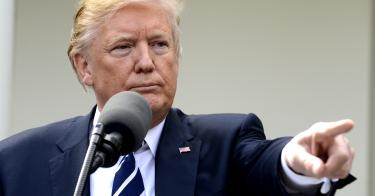They say the definition of insanity is doing the same thing over and over and expecting a different result. It’s a lesson the U.S. government has learned the hard way in Pakistan.
Fortunately, the Trump administration’s recent decision to suspend $255 million in aid to Islamabad serves as a welcome injection of sanity into the deeply dysfunctional U.S.-Pakistan relationship.
“The United States has foolishly given Pakistan more than 33 billion dollars in aid over the last 15 years, and they have given us nothing but lies and deceit, thinking of our leaders as fools,” President Donald Trump declared in a Jan. 1 tweet. “They give safe haven to the terrorists we hunt in Afghanistan, with little help. No more!”
The United States has foolishly given Pakistan more than 33 billion dollars in aid over the last 15 years, and they have given us nothing but lies & deceit, thinking of our leaders as fools. They give safe haven to the terrorists we hunt in Afghanistan, with little help. No more!
— Donald J. Trump (@realDonaldTrump) January 1, 2018
The anger and frustration expressed by the president is not only justified, it’s long overdue. Through its support to the Taliban, the Haqqani network, and their militant allies, Pakistan has for over a decade consistently and critically undermined the U.S.-led effort to bring peace and stability to Afghanistan.
In efforts to persuade Islamabad to abandon this nefarious “double game,” the U.S. government has deployed a constant stream of diplomatic and economic carrots—including $33 billion in aid and “reimbursements” since 2002—but virtually no sticks.
Predictably, each attempt has failed. It turns out it’s quite difficult to change a country’s cost -benefit calculation when you’re unwilling to impose any costs.
Pakistan’s double game, on the other hand, has brought it tangible benefits.
Islamabad has clear and consistent objectives in Afghanistan: It seeks a government in Kabul that is pliable, submissive, and hostile to India. Since the Afghan people—who are now deeply, understandably hostile to Pakistan and favorable toward India—will never vote such a government into power, the next best outcome for Pakistan is to ensure the government and the country are divided and unstable.
Not only has their quest for instability in Afghanistan been wildly successful, they’ve convinced America to foot much of the bill.
After being subjected to this double game for more than a decade, the patience and generosity of the American people has reached its limit.
Frustration has been building on Capitol Hill for years, reflected in a steady decline of U.S. aid to Pakistan. From $2.60 billion in 2013 to $1.60 billion in 2015, the request for aid appropriations and military reimbursements in 2018 fell to just $350 million.
The Trump administration is rightly signaling to Islamabad that “business as usual” has come to an end.
Pakistan can’t say it wasn’t warned. “We can no longer be silent about Pakistan’s safe havens for terrorist organizations,” Trump declared in August. “We have been paying Pakistan billions and billions of dollars at the same time they are housing the very terrorists that we are fighting. That will have to change and that will change immediately.”
Similarly, the Trump administration’s December 2017 National Security Strategy insisted: “[N]o partnership can survive a country’s support for militants and terrorists who target a partner’s own service members and officials.”
On the ground, the Trump administration has authorized the U.S. military to launch more—and more potent—drone strikes targeting militants operating along Pakistan’s western border after they were curtailed during the Obama administration’s second term.
This week, the administration also placed Pakistan on a Special Watch List for religious freedom violations.
At least one influential Pakistani politician seems to be taking the Trump administration seriously.
On Jan. 3, Nawaz Sharif, who resigned as prime minister in July, implored Pakistanis to “appraise our actions” and “break this spell of self-deception.” He said the time had come to put Pakistan’s “house in order” and “reflect on why the world holds negative opinions about us.”
Unfortunately, Pakistan’s all-powerful military appears unable to escape a prison of perpetual denial. “We have defeated extremism. …Now the terrorists come from Afghanistan,” Pakistan’s chief of air staff declared in November.
When U.S. Ambassador to the United Nations Nikki Haley accused Pakistan of “harbor[ing] the terrorists that attack our troops in Afghanistan,” a Pakistani military spokesman noted that Haley is of Indian origin and that the “current misunderstanding between Pakistan and the U.S. is created by India.”
That’s simply not going to cut it anymore. The status quo, long viewed by Washington as lamentable but tolerable, will no longer be a costless affair for Pakistan. Whether this leads our two countries toward a vicious cycle of hostility and recrimination is entirely dependent on Pakistan’s behavior.
As always, the path to stability, prosperity, and a true strategic partnership with America is clear: Abandon your support for Islamist extremists, end your paranoid infatuation with India, make peace with your Afghan neighbors, and respect freedom and religious liberty at home.
This piece originally appeared in The Daily Signal




